formerly eScholarship Editions


|
|
|
|
Your request for similar items found 20 book(s). | Modify Search | Displaying 1 - 20 of 20 book(s) | |
| 1. | 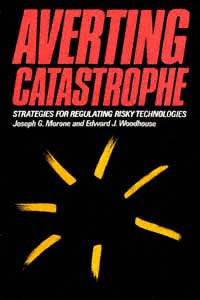 | Title: Averting catastrophe: strategies for regulating risky technologies Author: Morone, Joseph G Published: University of California Press, 1988 Subjects: Environmental Studies | History and Philosophy of Science | Politics Publisher's Description: Chernobyl, Bhopal, and Love Canal are symbols of the potentially catastrophic risks that go hand in hand with much modern technology. This volume is a non-partisan study of the imperfect but steadily developing system for containing the risks of such technologies as chemicals, nuclear power, and gen . . . [more] Similar Items |
| 2. |  | Title: The elusive embryo: how women and men approach new reproductive technologies Author: Becker, Gaylene Published: University of California Press, 2000 Subjects: Anthropology | Cultural Anthropology | Sociology | Gender Studies | Medical Anthropology | Medicine | Women's Studies | Science Publisher's Description: In the first book to examine the industry of reproductive technology from the perspective of the consumer, Gay Becker scrutinizes the staggering array of medical options available to women and men with fertility problems and assesses the toll - both financial and emotional - that the quest for a biological child often exacts from would-be parents. Becker interviewed hundreds of people over a period of years; their stories are presented here in their own words. Absorbing, informative, and in many cases moving, these stories address deep-seated notions about gender, self-worth, and the cultural ideal of biological parenthood. Becker moves beyond people's personal experiences to examine contemporary meanings of technology and the role of consumption in modern life. What emerges is a clear view of technology as culture, with technology the template on which issues such as gender, nature, and the body are being rewritten and continuously altered. The Elusive Embryo chronicles the history and development of reproductive technology, and shows how global forces in consumer culture have contributed to the industry's growth. Becker examines how increasing use of reproductive technology has changed ideas about "natural" pregnancy and birth. Discussing topics such as in vitro fertilization, how men and women "naturalize" the use of a donor, and what happens when new reproductive technologies don't work, Becker shows how the experience of infertility has become increasingly politicized as potential parents confront the powerful forces that shape this industry. The Elusive Embryo is accessible, well written, and well documented. It will be an invaluable resource for people using or considering new reproductive technologies as well as for social scientists and health professionals. [brief] Similar Items |
| 3. | 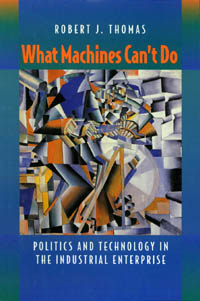 | Title: What machines can't do: politics and technology in the industrial enterprise Author: Thomas, Robert Joseph 1952- Published: University of California Press, 1994 Subjects: Economics and Business | Politics | Sociology | Technology and Society Publisher's Description: Virtually every manufacturing company has plans for an automated "factory of the future." But Robert J. Thomas argues that smart machines may not hold the key to an industrial renaissance. In this provocative and enlightening book, he takes us inside four successful manufacturing enterprises to reveal the social and political dynamics that are an integral part of new production technology. His interviews with nearly 300 individuals, from top corporate executives to engineers to workers and union representatives, give his study particular credibility and offer surprising insights into the organizational power struggles that determine the form and performance of new technologies.Thomas urges managers not to put blind hopes into smarter machines but to find smarter ways to organize people. As U.S. companies battle for survival in an era of growing global competition, What Machines Can't Do is an invaluable treatise on the ways we organize work. While its call for change is likely to be controversial, it will also attract anyone who wishes to understand the full impact of new technology on jobs, organizations, and the future of the industrial enterprise. [brief] Similar Items |
| 4. | 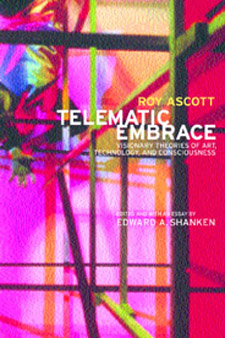 | Title: Telematic embrace: visionary theories of art, technology, and consciousness Author: Ascott, Roy Published: University of California Press, 2003 Subjects: Art | Art Theory | Electronic Media Publisher's Description: Long before e-mail and the Internet permeated society, Roy Ascott, a pioneering British artist and theorist, coined the term "telematic art" to describe the use of online computer networks as an artistic medium. In Telematic Embrace Edward A. Shanken gathers, for the first time, an impressive compilation of more than three decades of Ascott's philosophies on aesthetics, interactivity, and the sense of self and community in the telematic world of cyberspace. This book explores Ascott's ideas on how networked communication has shaped behavior and consciousness within and beyond the realm of what is conventionally defined as art. Telematics, a powerful marriage of computers and telecommunication, made technologies we now take for granted - such as e-mail and automated teller machines (ATMs) - part of our daily life, and made art a more interactive form of expression. Telematic art challenges traditional relationships between artist, artwork, and audience by allowing nonlocal audiences to influence the emergent qualities of the artwork, which consists of the ebb and flow of electronic information. These essays constitute a unique archaeology of ideas, tracing Ascott's meditations on the formation of consciousness through the intertwined cultural histories of art and technology from the 1960s to the present. Shanken's introduction situates Ascott's work within a history of ideas in art, technology, and philosophy. Given the increasing role of the Internet and the World Wide Web in the creation of commerce and community at the dawn of this new millennium, scholars, students, laypeople, policymakers, and artists will find this collection informative and thought-provoking. [brief] Similar Items |
| 5. | 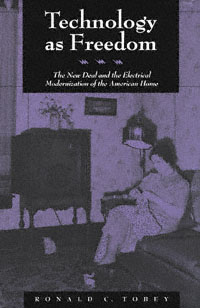 | Title: Technology as freedom: the New Deal and the electrical modernization of the American home Author: Tobey, Ronald C Published: University of California Press, 1997 Subjects: History | American Studies | Technology and Society | United States History Publisher's Description: Before 1930, the domestic market for electrical appliances was segmented, but New Deal policies and programs created a true mass market, reshaping the electrical and housing markets and guiding them toward mandated social goals. The New Deal identified electrical refrigeration as a key technology to reform domestic labor, raise family health, and build family assets. New Deal incentives led to nearly fifty percent of Title I National Housing Act loans being used to buy electric refrigerators in the 1930s. New Deal policies ultimately created the mass commodity culture of home-owning families that typified the conservative 1950s. [brief] Similar Items |
| 6. | 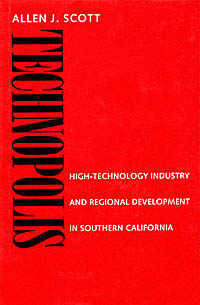 | Title: Technopolis: high-technology industry and regional development in southern California Author: Scott, Allen John Published: University of California Press, 1994 Subjects: Urban Studies | Geography | Politics Publisher's Description: Technopolis is a timely theoretical and empirical investigation of the world's largest high-technology industrial complex - Southern California. Allen Scott provides a new conceptual framework for understanding urban and regional growth processes based on a combination of inter-industrial, labor market, and geographical factors. He presents case studies and original data on three major industries that have become synonymous with Southern California: aircraft and parts, missiles and space equipment, and electronics. The business community will be particularly interested in Scott's diagnosis of post-Cold War economic ills and his suggestions for possible remedies.In good times or bad, knowledge of how Southern California's high-tech industry and regional development have interacted in the past and might interact in the future will be invaluable for regional and economic planners everywhere. [brief] Similar Items |
| 7. |  | Title: Technology and scholarly communication Author: Ekman, Richard Published: University of California Press, 1999 Subjects: Media Studies | Technology and Society | Library Science | Reference | Economics and Business | Electronic Media Publisher's Description: Electronic publishing has been gaining ground in recent years and is now a recognized part of the digital world. In the most comprehensive assessment of electronic publishing to date, thirty-one scholars, librarians, and publishers focus specifically on scholarly publishing. They analyze a number of case studies and offer original insights on a range of topics, including the financial costs involved, market forces, appropriate technological standards, licensing issues, intellectual property, copyright and associated user rights, and the changing roles of researchers, publishers, and librarians.The editors begin with an overview of scholarly communication and develop a novel interpretation of the important role that technology now plays. Many of the following chapters are based on actual electronic publishing projects in the sciences, social sciences, and humanities, so the evidence and data are drawn from real-life experiences. Of special value are the attempts to measure costs and patterns of usage of electronic publishing and digital libraries.Electronic publishing has moved well past the experimental stage, and with numerous projects under way this seems an appropriate time to assess its impact on the academic world, from teaching to research to administration. [brief] Similar Items |
| 8. | 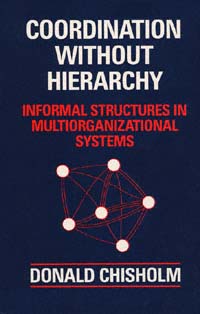 | Title: Coordination without hierarchy: informal structures in multiorganizational systems Author: Chisholm, Donald William Published: University of California Press, 1992 Subjects: Politics | Technology and Society Publisher's Description: The organizational history of American government during the past 100 years has been written principally in terms of the creation of larger and larger public organizations. Beginning with the Progressive movement, no matter the goal, the reflexive response has been to consolidate and centralize into formal hierarchies. That efficiency, effectiveness, and accountability, and the coordination necessary to achieve them, are promoted by such reorganizations has become widely accepted.Borrowing from social psychology, sociology, political science, and public administration, and using the public transit system of the San Francisco Bay area for illustrative purposes, Donald Chisholm directly challenges this received wisdom. He argues that, contrary to contemporary canons of public administration, we should actively resist the temptation to consolidate and centralize our public organizations. Rather, we should carefully match organizational design with observed types and levels of interdependence, since organizational systems that on the surface appear to be tightly linked webs of interdependence on closer examination often prove decomposable into relatively simpler subsystems that may be coordinated through decentralized, informal organizational arrangements.Chisholm finds that informal channels between actors at different organizations prove remarkably effective and durable as instruments of coordination. Developed and maintained as needed rather than according to a single preconceived design, informal channels, along with informal conventions and contracts, tend to match interorganization interdependence closely and to facilitate coordination. Relying on such measures reduces the cognitive demands and obviates the necessity for broadscale political agreement typical of coordination by centralized, formal organizations. They also advance other important values that are frequently absent in formally consolidated organizations, such as reliability, flexibility, and the representation of varied interests. Coordination Without Hierarchy is an incisive, penetrating work whose conclusions apply to a wide range of public organizations at all levels of government. It will be of interest to a broad array of social scientists and policymakers.In an earlier version, Coordination Without Hierarchy received the American Political Science Association 1985 Leonard D. White Award for the best doctoral dissertation in the field of public administration, including broadly related problems of policy formation and administrative theory. [brief] Similar Items |
| 9. | 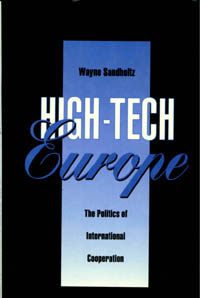 | Title: High-Tech Europe: the politics of international cooperation Author: Sandholtz, Wayne Published: University of California Press, 1992 Subjects: Politics | Public Policy | Economics and Business | Technology and Society Publisher's Description: A study of cooperative efforts in the high-tech industries of Europe. Sandholtz examines why collaboration came late to these countries, how protective walls came down, how countries work together in economically sensitive areas.Governments have recognized for decades the dynamic role played by microelectronics, computers, and telecommunications in the modern economy. Although Europe's deficiencies in these crucial sectors had long been acknowledged, it was not until the 1980s that European nations began collaborating to develop and promote high-tech industries. Their collaboration gives rise to many questions. Why, for example, did the joint efforts come at such a late date rather than in the 1960s or 70s? And how is it possible that they work together in economically sensitive areas? These questions point to fundamental issues in the areas of international cooperation, international institutions, and technology policy.Before the institution of the collaborative programs ESPRIT (European Strategic Programme for Research and Development in Information Technology), RACE (R & D in Advanced Communications-technologies in Europe), and EUREKA (European Research Coordination Agency) in the 1980s, each European country sought its own technological renaissance through protection of national firms behind walls of technical standards, procurement preferences, and research subsidies. Here is a thorough, carefully researched work that examines the breakdown of these walls. It will appeal to political scientists, economists, and scholars of technology and Western Europe interested in the political contours of the high-tech landscape. [brief] Similar Items |
| 10. |  | Title: A shield in space?: technology, politics, and the strategic defense initiative: how the Reagan Administration set out to make nuclear weapons "impotent and obsolete" and succumbed to the fallacy of the last move Author: Lakoff, Sanford A Published: University of California Press, 1989 Subjects: Politics | Political Theory | Technology and Society Publisher's Description: In March 1983, Ronald Reagan made one of the most controversial announcements of his presidency when he called on the nation's scientists and engineers to develop a defensive shield so impenetrable as to make nuclear weapons "impotent and obsolete." This book provides the first comprehensive review and evaluation of the project launched to implement that announcement - the project officially known as the Strategic Defense Initiative and more popularly as "Star Wars." The authors - a political scientist and a physicist who has played a key role in developing military technologies - provide an intriguing account of how political rather than technical judgment led to the initial decision, and they explain the technical issues in terms accessible to nonspecialists. Judging SDI as "a classic example of misplaced faith in the promise of technological salvation," the authors examine the implications of the program for strategy, arms control, the unity of the Western alliance, its prospective economic impact, and the way the American political process has dealt with all these issues. [brief] Similar Items |
| 11. |  | Title: Domestic individualism: imagining self in nineteenth-century America Author: Brown, Gillian Published: University of California Press, 1992 Subjects: Literature | Literary Theory and Criticism | American Literature | Gender Studies | United States History | American Studies Publisher's Description: Gillian Brown's book probes the key relationship between domestic ideology and formulations of the self in nineteenth-century America. Arguing that domesticity institutes gender, class, and racial distinctions that govern masculine as well as feminine identity, Brown brilliantly alters, for literary critics, feminists, and cultural historians, the critical perspective from which nineteenth-century American literature and culture have been viewed.In this study of the domestic constitution of individualism, Brown traces how the values of interiority, order, privacy, and enclosure associated with the American home come to define selfhood in general. By analyzing writings by Stowe, Hawthorne, Melville, Fern, and Gilman, and by examining other contemporary cultural modes - abolitionism, consumerism, architecture, interior decorating, motherhood, mesmerism, hysteria, and agoraphobia - she reconfigures the parameters of both domesticity and the patterns of self it fashions. Unfolding a representational history of the domestic, Brown's work offers striking new readings of the literary texts as well as of the cultural contexts that they embody. [brief] Similar Items |
| 12. |  | Title: Draw the lightning down: Benjamin Franklin and electrical technology in the Age of Enlightenment Author: Schiffer, Michael B Published: University of California Press, 2003 Subjects: History | Urban Studies | History of Science | Anthropology | American Studies | European History Publisher's Description: Most of us know - at least we've heard - that Benjamin Franklin conducted some kind of electrical experiment with a kite. What few of us realize - and what this book makes powerfully clear - is that Franklin played a major role in laying the foundations of modern electrical science and technology. This fast-paced book, rich with historical details and anecdotes, brings to life Franklin, the large international network of scientists and inventors in which he played a key role, and their amazing inventions. We learn what these early electrical devices - from lights and motors to musical and medical instruments - looked like, how they worked, and what their utilitarian and symbolic meanings were for those who invented and used them. Against the fascinating panorama of life in the eighteenth century, Michael Brian Schiffer tells the story of the very beginnings of our modern electrical world. The earliest electrical technologies were conceived in the laboratory apparatus of physicists; because of their surprising and diverse effects, however, these technologies rapidly made their way into many other communities and activities. Schiffer conducts us from community to community, showing how these technologies worked as they were put to use in public lectures, revolutionary experiments in chemistry and biology, and medical therapy. This story brings to light the arcane and long-forgotten inventions that made way for many modern technologies - including lightning rods (Franklin's invention), cardiac stimulation, xerography, and the internal combustion engine - and richly conveys the complex relationships among science, technology, and culture. [brief] Similar Items |
| 13. | 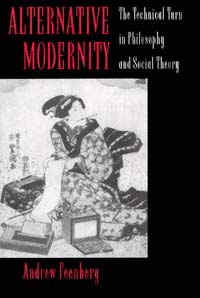 | Title: Alternative modernity: the technical turn in philosophy and social theory Author: Feenberg, Andrew Published: University of California Press, 1995 Subjects: Philosophy | Social and Political Thought | History and Philosophy of Science | Popular Culture Publisher's Description: In this new collection of essays, Andrew Feenberg argues that conflicts over the design and organization of the technical systems that structure our society shape deep choices for the future. A pioneer in the philosophy of technology, Feenberg demonstrates the continuing vitality of the critical theory of the Frankfurt School. He calls into question the anti-technological stance commonly associated with its theoretical legacy and argues that technology contains potentialities that could be developed as the basis for an alternative form of modern society.Feenberg's critical reflections on the ideas of Jürgen Habermas, Herbert Marcuse, Jean-François Lyotard, and Kitaro Nishida shed new light on the philosophical study of technology and modernity. He contests the prevalent conception of technology as an unstoppable force responsive only to its own internal dynamic and politicizes the discussion of its social and cultural construction.This argument is substantiated in a series of compelling and well-grounded case studies. Through his exploration of science fiction and film, AIDS research, the French experience with the "information superhighway," and the Japanese reception of Western values, he demonstrates how technology, when subjected to public pressure and debate, can incorporate ethical and aesthetic values. [brief] Similar Items |
| 14. | 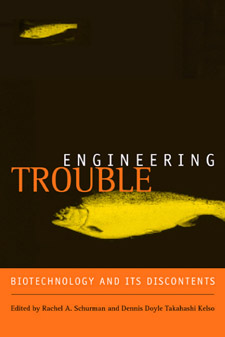 | Title: Engineering trouble: biotechnology and its discontents Author: Schurman, Rachel Published: University of California Press, 2003 Subjects: Sociology | Conservation | EcologyEvolutionEnvironment | Technology and Society | Agriculture | Technology | Public Policy Publisher's Description: Talk of genetically engineered organisms (GEOs) has moved from the hushed corridors of life science corporations to the front pages of the world's major newspapers. As Europeans began rejecting genetically engineered foods in the marketplace, the StarLink corn incident exploded in the United States and farmers set fire to genetically modified crops in India. Citizens and consumers have become increasingly aware of and troubled by the issues surrounding these new technologies. Considering cases from agriculture, food, forestry, and pharmaceuticals, this book examines some of the most pressing questions raised by genetic engineering. What determines whether GEOs enter the food supply, and how are such decisions being made? How is the biotechnology industry using its power to reshape food, fiber, and pharmaceutical production, and how are citizen-activists challenging these initiatives? And what are the social and political consequences of global differences over GEOs? [brief] Similar Items |
| 15. | 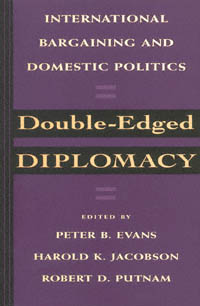 | Title: Double-edged diplomacy: international bargaining and domestic politics Author: Evans, Peter B 1944- Published: University of California Press, 1993 Subjects: Politics | Economics and Business | Public Policy | Sociology Publisher's Description: This original look at the dynamics of international relations untangles the vigorous interaction of domestic and international politics on subjects as diverse as nuclear disarmament, human rights, and trade. An eminent group of political scientists demonstrates how international bargaining that reflects domestic political agendas can be undone when it ignores the influence of domestic constituencies.The eleven studies in Double-Edged Diplomacy provide a major step in furthering a more complete understanding of how politics between nations affects politics within nations and vice versa. The result is a striking new paradigm for comprehending world events at a time when the global and the domestic are becoming ever more linked. [brief] Similar Items |
| 16. | 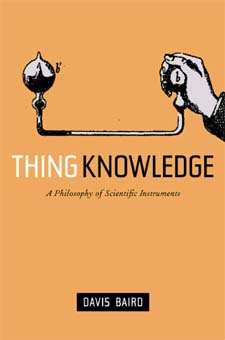 | Title: Thing knowledge: a philosophy of scientific instruments Author: Baird, Davis Published: University of California Press, 2004 Subjects: Philosophy | Technology and Society Publisher's Description: Western philosophers have traditionally concentrated on theory as the means for expressing knowledge about a variety of phenomena. This absorbing book challenges this fundamental notion by showing how objects themselves, specifically scientific instruments, can express knowledge. As he considers numerous intriguing examples, Davis Baird gives us the tools to "read" the material products of science and technology and to understand their place in culture. Making a provocative and original challenge to our conception of knowledge itself, Thing Knowledge demands that we take a new look at theories of science and technology, knowledge, progress, and change. Baird considers a wide range of instruments, including Faraday's first electric motor, eighteenth-century mechanical models of the solar system, the cyclotron, various instruments developed by analytical chemists between 1930 and 1960, spectrometers, and more. [brief] Similar Items |
| 17. |  | Title: Assembled in Japan: electrical goods and the making of the Japanese consumer Author: Partner, Simon Published: University of California Press, 2000 Subjects: History | Japan | Media Studies | Technology and Society | Consumerism Publisher's Description: Assembled in Japan investigates one of the great success stories of the twentieth century: the rise of the Japanese electronics industry. Contrary to mainstream interpretation, Simon Partner discovers that behind the meteoric rise of Sony, Matsushita, Toshiba, and other electrical goods companies was neither the iron hand of Japan's Ministry of International Trade and Industry nor a government-sponsored export-led growth policy, but rather an explosion of domestic consumer demand that began in the 1950s.This powerful consumer boom differed fundamentally from the one under way at the same time in the United States in that it began from widespread poverty and comparatively miserable living conditions. Beginning with a discussion of the prewar origins of the consumer engine that was to take off under the American Occupation, Partner quickly turns his sights on the business leaders, inventors, laborers, and ordinary citizens who participated in the broadly successful effort to create new markets for expensive, unfamiliar new products.Throughout, the author relates these pressure-cooker years in Japan to the key themes of twentieth-century experience worldwide: the role of technology in promoting social change, the rise of mass consumer societies, and the construction of gender in advanced industrial economies. [brief] Similar Items |
| 18. | 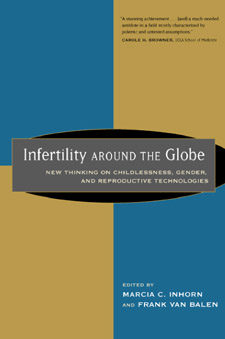 | Title: Infertility around the globe: new thinking on childlessness, gender, and reproductive technologies Author: Inhorn, Marcia Claire 1957- Published: University of California Press, 2002 Subjects: Anthropology | Cultural Anthropology | Asian Studies | Medical Anthropology | Ethnic Studies | Gender Studies | Politics | Medicine | Sociology | Sociology Publisher's Description: This exceptional collection of essays breaks new ground by examining the global impact of infertility as a major reproductive health issue, one that has profoundly affected the lives of countless women and men. Based on original research by seventeen internationally acclaimed social scientists, it is the first book to investigate the use of reproductive technologies in non-Western countries. Provocative and incisive, it is the most substantial work to date on the subject of infertility. With infertility as the lens through which a wide range of social issues is explored, the contributors address a far-reaching array of topics: why infertility has been neglected in population studies, how the deeply gendered nature of infertility sets the blame squarely on women's shoulders, how infertility and its treatment transform family dynamics and relationships, and the distribution of medical and marital power. The chapters present informed and sophisticated investigations into cultural perceptions of infertility in numerous countries, including China, India, the nations of sub-Saharan Africa, Vietnam, Costa Rica, Egypt, Israel, the United States, and the nations of Europe. Poised to become the quintessential reference on infertility from an international social science perspective, Infertility around the Globe makes a powerful argument that involuntary childlessness is a complex phenomenon that has far-reaching significance worldwide. [brief] Similar Items |
| 19. | 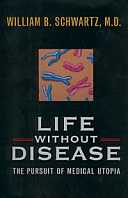 | Title: Life without disease: the pursuit of medical utopia Author: Schwartz, William B 1922- Published: University of California Press, 1998 Subjects: Science | Medicine | Economics and Business | History and Philosophy of Science | Public Policy Publisher's Description: The chaotic state of today's health care is the result of an explosion of effective medical technologies. Rising costs will continue to trouble U.S. health care in the coming decades, but new molecular strategies may eventually contain costs. As life expectancy is dramatically extended by molecular medicine, a growing population of the aged will bring new problems. In the next fifty years genetic intervention will shift the focus of medicine in the United States from repairing the ravages of disease to preventing the onset of disease. Understanding the role of genes in human health, says Dr. William B. Schwartz, is the driving force that will change the direction of medical care, and the age-old dream of life without disease may come close to realization by the middle of the next century. Medical care in 2050 will be vastly more effective, Schwartz maintains, and it may also be less expensive than the resource-intensive procedures such as coronary bypass surgery that medicine relies on today.Schwartz's alluring prospect of a medical utopia raises urgent questions, however. What are the scientific and public policy obstacles that must be overcome if such a goal is to become a reality? Restrictions on access imposed by managed care plans, the corporatization of charitable health care institutions, the increasing numbers of citizens without health insurance, the problems with malpractice insurance, and the threatened Medicare bankruptcy - all are the legacy of medicine's great progress in mastering the human body and society's inability to assimilate that mastery into existing economic, ethical, and legal structures. And if the average American life span is 130 years, a genuine possibility by 2050, what social and economic problems will result?Schwartz examines the forces that have brought us to the current health care state and shows how those same forces will exert themselves in the decades ahead. Focusing on the inextricable link between scientific progress and health policy, he encourages a careful examination of these two forces in order to determine the kind of medical utopia that awaits us. The decisions we make will affect not only our own care, but also the system of care we bequeath to our children. [brief] Similar Items |
| 20. | 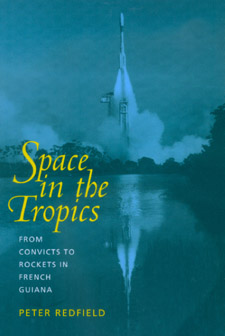 | Title: Space in the tropics: from convicts to rockets in French Guiana Author: Redfield, Peter 1965- Published: University of California Press, 2000 Subjects: Anthropology | Cultural Anthropology | Geography | French Studies | European Studies | Technology Publisher's Description: Rockets roar into space - bearing roughly half the world's commercial satellites - from the same South American coastal rainforest where convicts once did time on infamous Devil's Island. What makes Space in the Tropics enthralling is anthropologist Peter Redfield's ability to draw from these two disparate European projects in French Guiana a gleaming web of ideas about the intersections of nature and culture. In comparing the Franco-European Ariane rocket program with the earlier penal experiment, Redfield connects the myth of Robinson Crusoe, nineteenth-century prison reform, the Dreyfus Affair, tropical medicine, postwar exploration of outer space, satellite technology, development, and ecotourism with a focus on place, and the incorporation of this particular place into greater extended systems. Examining the wider context of the Ariane program, he argues that technology and nature must be understood within a greater ecology of displacement and makes a case for the importance of margins in understanding the trajectories of modern life. [brief] Similar Items |